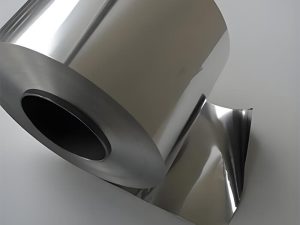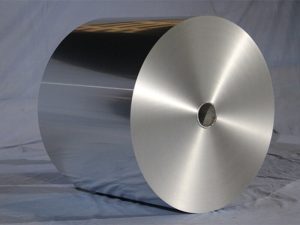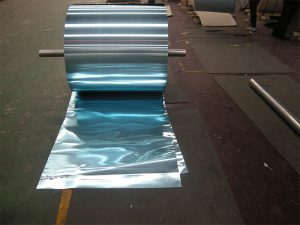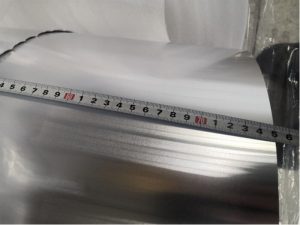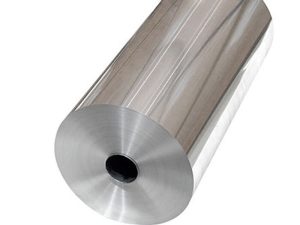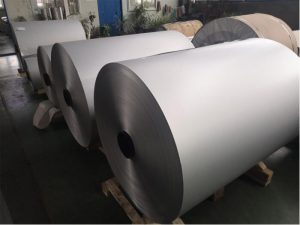Introduction
Condenser fins are critical components in heat exchange systems, playing a pivotal role in efficient heat transfer. At Huasheng Aluminum, we specialize in manufacturing and wholesaling high-quality aluminum foil for condenser fins, designed to optimize performance and durability. Our products are engineered to meet the demands of various industries, including refrigeration, air conditioning, and heat exchange systems.
Understanding Condenser Fins
Condenser fins are thin, flat structures that increase the surface area for heat exchange, thereby enhancing heat dissipation and system performance. They are attached to tubes or pipes in condensers, facilitating efficient heat transfer between the refrigerant and the surrounding air.
Specifications of Aluminum Foil for Condenser Fins
Our aluminum foil rolls for condenser fins are manufactured to meet specific industry standards. Here’s an overview of the key specifications:
Alloy Composition
| Alloy |
Aluminum |
Copper |
Iron |
Silicon |
Manganese |
| 1100 |
min 99.0% |
0.05-0.20% |
0.0-0.95% |
0.0-0.95% |
0.0-0.05% |
| 3003 |
min 99.0% |
0.05-0.20% |
0.0-0.95% |
0.0-0.95% |
0.0-0.05% |
| 3102 |
min 99.0% |
Higher than 3003 |
0.0-0.95% |
0.0-0.95% |
0.0-0.05% |
Key Characteristics
- Corrosion Resistance: Our aluminum foils exhibit excellent resistance to corrosion, ensuring long-lasting performance.
- Thermal Conductivity: High thermal conductivity for efficient heat transfer.
- Formability: Good formability and processability, making it suitable for fin applications.
- Strength: While 1100 is less strong, it is suitable for fins; 3003 and 3102 offer improved strength.
Thickness, Width, and Length
- Thickness: Ranging from 0.1 mm to 0.3 mm, tailored to specific condenser designs and performance requirements.
- Width and Length: Designed to optimize surface area for heat exchange, with standard dimensions based on condenser size and heat transfer efficiency.
Surface Treatment
Our aluminum fins may undergo surface treatments to increase corrosion resistance, including coating or anodizing processes.
Temper
The temper of aluminum, whether annealed or heat-treated, affects the flexibility and formability of the fins, ensuring easy formation and connection to tubes or pipes.
The Importance of Aluminum Foil in Condenser Fins
- Enhance Heat Transfer: Aluminum’s high thermal conductivity ensures efficient heat transfer, increasing system efficiency.
- Improve Durability: Corrosion resistance extends the life of condenser fins.
- Energy Efficiency: Reflective properties improve energy efficiency by minimizing heat gain.
- Cost-Effective Manufacturing: Lightweight and recyclable, contributing to cost-effective manufacturing and sustainability.
Manufacturing Process
Our manufacturing process involves several key steps to ensure the quality and performance of our aluminum foil for condenser fins:
- Scrolling: Rolling aluminum ingot into thin sheets with precise thickness control.
- Annealing: Heat treatment to improve flexibility and ductility.
- Surface Treatment: Enhancing corrosion resistance through coatings or anodizing.
- Slitting and Cutting: Precision cutting to size for application to condenser fins.
Case Studies and Practical Applications
Automotive Air Conditioning System
- Alloy: Aluminum 1100 or 3003, balancing thermal conductivity, formability, and corrosion resistance.
- Coating: Corrosion-resistant coatings like epoxy or hydrophilic coatings to protect from environmental exposure.
- Thickness: 0.15mm to 0.20mm for efficient heat dissipation in confined spaces.
Commercial and Residential Refrigeration Units
- Alloy: Aluminum 1100 or 3003, offering a balance of properties for refrigeration applications.
- Coating: Corrosion-resistant coatings to extend service life in moist conditions.
- Thickness: 0.15mm to 0.25mm for larger fins handling higher heat loads.
Industrial Heat Exchangers
- Alloy: Aluminum 3003 or 6061, with 6061 providing increased strength for high heat loads.
- Coating: Special coatings for industrial applications, protecting against corrosive chemicals.
- Thickness: 0.25mm to 0.35mm for structural integrity and high heat load management.
Product Comparisons
| Feature |
Aluminum 1100 |
Aluminum 3003 |
Aluminum 3102 |
Aluminum 6061 |
| Strength |
Low |
Medium |
High |
Very High |
| Corrosion Resistance |
Good |
Good |
Very Good |
Good |
| Thermal Conductivity |
High |
High |
High |
Moderate |
| Formability |
Good |
Good |
Good |
Moderate |
